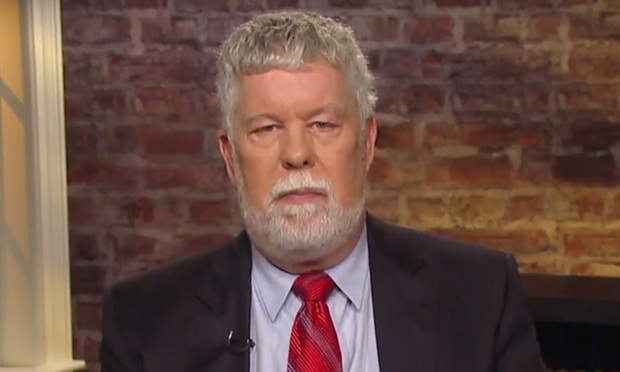Sex in the Office, Dual Stock Structure Make for a Corporate Governance 'Disaster'
The CEO of Liberty Tax Service has landed his company in quite the corporate governance quandary.
November 13, 2017 at 05:20 PM
5 minute read
 John Hewitt, founder and CEO of Liberty Tax Service. Photo credit: Youtube
John Hewitt, founder and CEO of Liberty Tax Service. Photo credit: Youtube Liberty Tax Service Inc., which has more than 4,000 offices in the United States and Canada, is caught up in its own Weinsteinesque sex scandal that has left the company and general counsel Vanessa Szajnoga in a corporate governance quandary.
According to a filing with the U.S. Securities and Exchange Commission Monday, the company dismissed founder John Hewitt from his CEO post on Sept. 5 after an internal investigation into his alleged sexual escapades in the office. The company said it gave him a $1.8 million severance package.
But Hewitt remained as chairman of the board, controlling a majority of the nine directors because his Class B stock allows him to appoint five, while Class A shareholders elect four. He refused further efforts by a special committee working with management, advisers and the company's lenders to convince him to resign for the good of the company.
In essence, Liberty paid Hewitt $1.8 million to go away but he still maintains a good deal of control over the company.
The brouhaha has led to dissension on the board; the departures of three directors, plus the chief financial officer and a vice president; and the resignation of a fourth director in a letter of protest made public on Monday.
“That's a disaster,” said one lawyer who works on corporate governance issues, but asked not to be named because her law firm doesn't allow her to speak about specific companies. If Hewitt were listening to an adviser, the attorney said, “someone should advise him that the entire company could implode.”
The resignation letter from independent director John Garel, who garnered the most votes among the four independents elected on Sept. 15, was included in Monday's SEC filing. Garel, a Liberty director for 14 years and chair of its corporate governance committee, spelled out these events in the letter:
In July the company received an ethics hotline complaint about Hewitt's sexual misconduct in the office. The board's audit committee hired Skadden, Arps, Slate, Meagher & Flom to investigate.
The investigatory report “included credible evidence that Mr. Hewitt had engaged in an array of inappropriate conduct, both personally and involving business matters, while serving as Liberty Tax's CEO and chairman,” the letter said. “Mr. Hewitt refused to cooperate in the investigation and failed to, in any way, attempt to address or alleviate the concerns of employees.”
Neither Hewitt nor Szajnoga, the GC, could immediately be reached for comment. But some details of the report were leaked to the The Virginian-Pilot newspaper on Nov. 9 and included allegations that Hewitt “hired relatives of female employees he was apparently seeing romantically,” and that he scheduled training meetings in cities where the New York Yankees were playing so he could attend the games.
The newspaper quoted Szajnoga as saying in an email that the company was “not in a position to confirm any such report nor can we discuss internal matters.”
“Liberty is a company built upon a strong foundation of integrity and respect for our employees, franchisees and customers,” she told the newspaper. “We are fully committed to the principles as outlined in our code of conduct and the behavior you assert would certainly not be tolerated.”
After removing Hewitt as CEO, the company announced publicly on Sept. 6 that it was trying to negotiate Hewitt's separation and the purchase of his Class B stock shares. He rejected the deal. Then the special committee offered Hewitt a new deal on Sept. 28, but again he rejected it.
Instead Hewitt removed two of his own directors, who apparently had sided with the independents, and replaced them with two new ones loyal to him. Their removal was followed by the other resignations.
“These changes contravene the board's decision to terminate Mr. Hewitt and allow him via his Class B rights to, in effect, manage the company,” Garel's letter explained. “Mr. Hewitt's conduct and refusal to do what I believe is appropriate on behalf of the company and its stockholders has left me in a very difficult position . . . I hereby tender my notice that I will not seek re-election at the next annual shareholders meeting.”
The mess at Liberty “is an excellent example of the problem with dual class stock, and the kind of controversy it creates,” said Charles Elson, director of the John L. Weinberg Center for Corporate Governance at the University of Delaware. “It creates a significant accountability issue.”
Elson said Hewitt can still exercise control of the company “despite the fact that his economic interest [in Class B stock] may not be as much [as Class A shareholders].”
And there is nothing the independent directors or the general counsel can do about it, Elson said, adding that eventually the issue is likely to be litigated.
The general counsel, he noted, is there “to represent the company and the shareholders, including those not aligned” with Hewitt. He called the GC's spot “a tough position.”
This content has been archived. It is available through our partners, LexisNexis® and Bloomberg Law.
To view this content, please continue to their sites.
Not a Lexis Subscriber?
Subscribe Now
Not a Bloomberg Law Subscriber?
Subscribe Now
NOT FOR REPRINT
© 2025 ALM Global, LLC, All Rights Reserved. Request academic re-use from www.copyright.com. All other uses, submit a request to [email protected]. For more information visit Asset & Logo Licensing.
You Might Like
View All
Bankruptcy Filings Surged in First Half of 2024 Amid Uptick in Big Chapter 11 Cases
3 minute read

Ernst & Young's US GC Steps Aside Amid Scrutiny of Firm's Handling of Cheating Scandal
4 minute read
Report Suggests SEC Stepping Up Scrutiny of Deceitful Accounting
Trending Stories
- 1The FTC’s Noncompete Rule Is Likely Dead
- 2COVID-19 Vaccine Suit Against United Airlines Hangs on Right-to-Sue Letter Date
- 3People in the News—Jan. 10, 2025—Lamb McErlane, Saxton & Stump
- 4How I Made Partner: 'Be Open With Partners About Your Strengths,' Says Ha Jin Lee of Sullivan & Cromwell
- 5Essential Labor Shifts: Navigating Noncompetes, Workplace Politics and the AI Revolution
Who Got The Work
Michael G. Bongiorno, Andrew Scott Dulberg and Elizabeth E. Driscoll from Wilmer Cutler Pickering Hale and Dorr have stepped in to represent Symbotic Inc., an A.I.-enabled technology platform that focuses on increasing supply chain efficiency, and other defendants in a pending shareholder derivative lawsuit. The case, filed Oct. 2 in Massachusetts District Court by the Brown Law Firm on behalf of Stephen Austen, accuses certain officers and directors of misleading investors in regard to Symbotic's potential for margin growth by failing to disclose that the company was not equipped to timely deploy its systems or manage expenses through project delays. The case, assigned to U.S. District Judge Nathaniel M. Gorton, is 1:24-cv-12522, Austen v. Cohen et al.
Who Got The Work
Edmund Polubinski and Marie Killmond of Davis Polk & Wardwell have entered appearances for data platform software development company MongoDB and other defendants in a pending shareholder derivative lawsuit. The action, filed Oct. 7 in New York Southern District Court by the Brown Law Firm, accuses the company's directors and/or officers of falsely expressing confidence in the company’s restructuring of its sales incentive plan and downplaying the severity of decreases in its upfront commitments. The case is 1:24-cv-07594, Roy v. Ittycheria et al.
Who Got The Work
Amy O. Bruchs and Kurt F. Ellison of Michael Best & Friedrich have entered appearances for Epic Systems Corp. in a pending employment discrimination lawsuit. The suit was filed Sept. 7 in Wisconsin Western District Court by Levine Eisberner LLC and Siri & Glimstad on behalf of a project manager who claims that he was wrongfully terminated after applying for a religious exemption to the defendant's COVID-19 vaccine mandate. The case, assigned to U.S. Magistrate Judge Anita Marie Boor, is 3:24-cv-00630, Secker, Nathan v. Epic Systems Corporation.
Who Got The Work
David X. Sullivan, Thomas J. Finn and Gregory A. Hall from McCarter & English have entered appearances for Sunrun Installation Services in a pending civil rights lawsuit. The complaint was filed Sept. 4 in Connecticut District Court by attorney Robert M. Berke on behalf of former employee George Edward Steins, who was arrested and charged with employing an unregistered home improvement salesperson. The complaint alleges that had Sunrun informed the Connecticut Department of Consumer Protection that the plaintiff's employment had ended in 2017 and that he no longer held Sunrun's home improvement contractor license, he would not have been hit with charges, which were dismissed in May 2024. The case, assigned to U.S. District Judge Jeffrey A. Meyer, is 3:24-cv-01423, Steins v. Sunrun, Inc. et al.
Who Got The Work
Greenberg Traurig shareholder Joshua L. Raskin has entered an appearance for boohoo.com UK Ltd. in a pending patent infringement lawsuit. The suit, filed Sept. 3 in Texas Eastern District Court by Rozier Hardt McDonough on behalf of Alto Dynamics, asserts five patents related to an online shopping platform. The case, assigned to U.S. District Judge Rodney Gilstrap, is 2:24-cv-00719, Alto Dynamics, LLC v. boohoo.com UK Limited.
Featured Firms
Law Offices of Gary Martin Hays & Associates, P.C.
(470) 294-1674
Law Offices of Mark E. Salomone
(857) 444-6468
Smith & Hassler
(713) 739-1250






